We’ve all seen ants in our gardens. They’re annoying little creatures that seem to multiply faster than rabbits.
How to get rid of ants in a garden?
There are many ways to get rid of ants in a garden, but most involve chemicals. Chemicals aren’t always safe, and they can cause problems with your plants and even harm wildlife.
If you want to eliminate these pests from your garden naturally, then read on. In this article I’ll tell you how to get rid of ants in a garden without using harmful chemicals.
- Related article: Guide to Starting a Vegetable Garden

3 Key Signs of an Ant Infestation
The first step is to recognize when you have an ant problem. If you see ants crawling around, or if you notice them feeding on the leaves of your plants, then it’s time to act.
Here are the key signs of an ant infestation:
1. Piles of Sandy Soil or Sawdust
You’ll always see a few ants around in your garden, but if you see sandy soil piling up, then chances are its ants making their tunnels. These piles are usually found near cracks in patio stones.
Look closely, and you’ll probably be able to see their entrance holes. If you’re not sure if it is ants, push a little soil back into one of the holes – if it is ants, they’ll rush out to see who is messing with their nest!
Carpenter ants live in dead wood, so if you notice little piles of sawdust near your wood pile or garden shed, the chances are some carpenters have moved in.
2. You See Lots of Ants
Ants will make their nest anywhere that is undisturbed for a period of time.
In late spring and summer, they can move in pretty quickly, so don’t be surprised to find a sudden swarm of ants while turning your compost heap or planting out young plants.
3. Sticky Leaves
Sticky plant leaves are often a sign of honeydew secreted by aphids. This sticky substance can often fall on the plants below the affected plant.
Aphids are farmed by ants, who collect this sweet sticky substance. As ants protect aphids from their natural predators, an abundance of aphids can often mean an ant infestation is present.

4 Ways Ants Help Your Garden
Ants can be an annoyance, but they are also a valuable part of the ecosystem and won’t usually cause much damage to your plants.
1. Ants Naturally Control Pests
Although they look after and protect aphids, ants are the natural predators of many other garden pests. Fleas, caterpillars, fly larvae, and termites are all targeted by ants.
Because of the natural equilibrium that comes from the predator/prey relationship, getting rid of ants in your garden can sometimes tip the balance in a way you don’t want. It allows room for bugs that will cause more issues for your plants.
2. Ants Improve Pollination Rates
Some studies suggest that ants can deter ineffectual pollinators in favor of more effective ones. Ants can also pollinate some flowers themselves.
3. Ants Encourage a Healthy Ecosystem
Ants are like caretakers of your garden. They clean up any dead insects and plant matter, aiding in decomposition. They then carry these pieces of decaying material into their nests underground, helping to add natural fertilizer to the soil.
Ants have a special position on the food chain. Not only will they feed on other insects, but they are also prey for a large number of species.
Ants also pollinate some wildflowers and carry seeds, which help with plant propagation and spread.
4. Ants Help Aerate your Soil
As ants clear soil out to make their tunnels, they are also letting in air and bringing moisture deep into the soil. Ants actually move about the same amount of soil as earthworms, making them just as effective aerators as the most popular garden helper.

3 Ways Ants Hurt Your Garden
While ants themselves won’t destroy any plants, they still can cause problems in your garden.
1. Ants Increase Pest Populations
While ants can limit some of the bugs in your garden, they undoubtedly will increase your aphid population.
Ants “farm” aphids for the sweet honeydew that they secrete. As such, they will herd aphids onto plants and protect them from predators.
In order to get the most from their “cattle,” they ensure that the aphids stay in one place by biting off their wings and secreting an aphid-pacifying chemical from their feet.
All this means that – if left unchecked – plants and trees which are used by the farmer ants will suffer from constant aphid infestation.
2. Issues With Ant’s Nests
Ants will excavate soil and deposit it on the surface when digging out the tunnels for their nest. This build-up of dirt can cause a nuisance on lawns and sometimes can mean low-lying plants get buried by the extracted soil.
Ants in plant pots can also cause issues, disturbing the roots of plants.
3. Ants Cause Pain and Property Damage
While mainly armless, all ants can bite. The severity of the bite depends on the ant, and most ants will just leave a tiny mark on your skin that lasts about a week.
Fire ants – mainly found in subtropical climates like the southeastern USA – will sing and leave a painful, itchy blister on the skin, and those with an allergy to the ant’s venom may need emergency treatment.
If you have ants in your garden, there is a chance that they will make it into your home. Ants can cause serious issues with the foundations of a home, and carpenter ants can cause a lot of damage to any wooden structures.
Ants will also be attracted to your kitchen and can ruin your foods. Many people don’t mind brushing a few ants off their food and continuing to eat (or even munching on a few ants!).
But ants can spread salmonella by crawling over your food as you don’t know what they have walked over before they get to your food.

10 Ways How to Get Rid of Ants in a Garden
Before you try and combat an ant problem, you need to accept that you won’t be able to get rid of ants completely. There are so many ants worldwide that some speculate their total weight is the same as that of all humans.
If you get rid of ants from a prime nesting spot, it won’t be long before a new colony moves in. The best you can hope for is to keep them out of the areas that are an issue.
Here are the top ways to get rid of ants in your garden:
- Call pest control. If you have a serious ant infestation, then the best way to get it under control is to call in a professional. Once the issue has been brought back to a manageable level, you can then use the other methods on this list to prevent the ant population in your garden from becoming a problem.
- Pour boiling water over the nest. For those hard-hearted enough to want to kill off a load of ants, boiling water is the most natural method of killing ants. You may have to pour a couple of pans full of boiling water over a nest to kill all the ants completely. This method can also be used to kill off flying ants before they leave their nest to make another colony.
- Kill off the eggs. Getting rid of ant eggs will effectively control the ant population. To do this, you dig out a nest and spread it out on a tarp in full sun. Fold over one edge of the tarp to create shade; the ants will then move all the eggs into the shade, and you can scoop them up. The eggs can then be dried out in the sun or fed to pond fish.
- Oil and soap spray. This spray is good for getting ants when they are out and about. Mix dish soap with olive oil and water and pour it into a spray bottle. You can spray ants off plants (this doubles as an aphid spray) or pour the mixture into an ant’s nest.
- Sugar mixed with boric acid. This sweet but deadly mixture can be placed outside an ants nest. Ants will be attracted to the sweetness of the sugar, then take the mixture into the nest to feed to the queen. Take extra care if you have pets or kids, as borax is toxic.
- White vinegar. White vinegar is harmful to ants but isn’t toxic and won’t harm your plants.
- Nematodes are microscopic worms that can be purchased online. These tiny predators will hunt down and eat ants. Ants will also know these worms are about and will likely move their nest to a safer place. Find nematodes online.
- Diatomaceous earth. Diatomaceous earth (DE) is sharp and abrasive, so it causes cuts in the ant’s exoskeleton. The DE then dries out the ant causing it to die slowly. Place the DE around nests or in the path of the ants. Diatomaceous earth is an increasingly popular method of pest control, but it should be handled with care as it can irritate skin and eyes, and it is easily breathed in when first applied.
- Insect-repelling plants. Some plants have a strong smell that can deter ants. These plants include basil, rosemary, lavender, chrysanthemum, marigold, mint, and eucalyptus. You can also use ground spices like cinnamon and cloves.
- Lemon juice. Lemon juice will destroy ants’ scent trails, making it good to use on plants in which ants are farming aphids. A mix of half lemon juice and half water can be sprayed onto affected plants as often as needed. Lemon oil is also toxic to ants.
Getting Rid of Ants in Gardens Final Thoughts
There are many ways to get rid of ants in gardens. It depends on how much time and effort you’re willing to put into the problem.
If you don’t mind spending some time cleaning up after the ants, you can probably just let nature take its course. But if you’d prefer to keep things under control, there are plenty of options available.
Learn more about pests in your garden:


